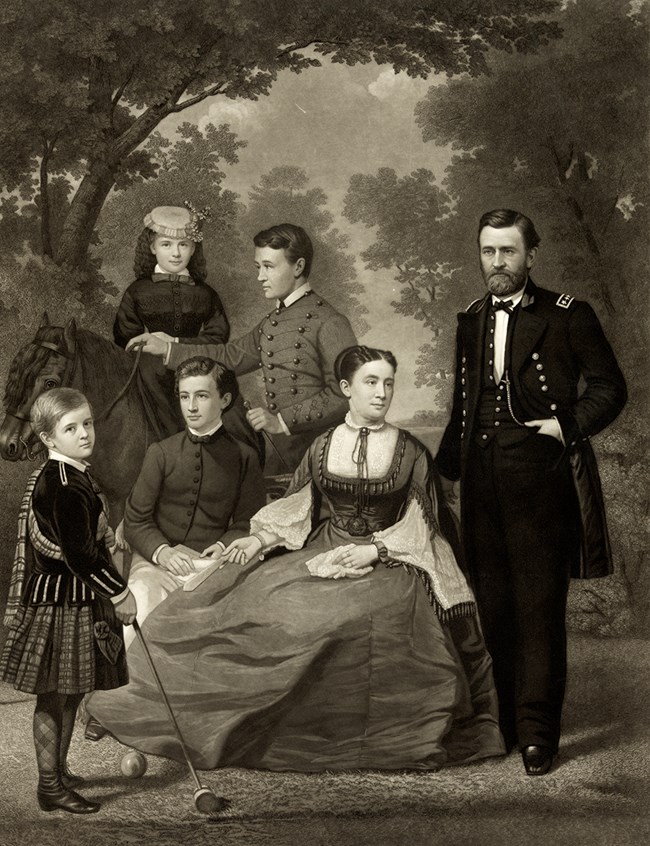Part of a series of articles titled Ulysses S. Grant NHS Virtual Junior Ranger Activity Book.
Article
Separation from Family: A Conversation Activity

Due to recent circumstances, people today are experiencing separation from loved ones. Ulysses S. Grant was often separated from his family while serving in the army, prior to and during the Civil War. Ulysses and his wife Julia had four children, Fred, Ulysses Jr., Nellie, and Jesse. When he was separated from his wife and children, he often experienced great anxiety and loneliness. Many families today can identify with Grant’s struggle and may also feel lonely or anxious during our uncertain times.
-
Who in your family are you separated from now that you miss? Write individual names on small pieces of paper or post-its.
-
Share your names with others doing this activity with you. You might have the same ones or slightly different. Place all names on a larger piece of paper for future reference. If doing this virtually with others, compile a list to share.
-
How have recent circumstances affected your interactions and relationships with these family members? What feelings are you experiencing because of these changes?
From 1848 to 1852 Julia Grant, and later also baby son Fred, accompanied her husband as he moved from one army post to the next. Being with his family was very important to Ulysses, who cared more for his loved ones than anything else in his life. Unfortunately, in 1852, the army assigned Grant to Fort Vancouver on the Pacific West Coast. Julia was unable to accompany him because she was pregnant with their second child and the journey would be too dangerous. Grant was forced to leave his family behind at White Haven, near St. Louis, Missouri. He did not know at the time that he would miss the birth of his second child and not see Julia and his young children for two years. Though Grant could not be with his family on the West Coast, he took comfort in the memories he had made while at home and stayed in touch with Julia and the children through letters.
On January 29, 1853 Ulysses S. Grant wrote from Fort Vancouver in the Oregon Territory to his wife Julia at White Haven in St. Louis, Missouri. He was responding to a letter from Julia, which included details about their children.
I will now notice your last sweet letter. It was one of the most interesting letters I have received, because it told me so much about our dear little ones…It made my tears almost start in my eyes, with joy, to hear so much about them by one Mail. I only wish dearest that I could be there to look upon them now, and see my dear wife again.
On February 15, 1853 Ulysses received another letter at Columbia Barracks (Fort Vancouver) which Julia had mailed from White Haven. Grant was “delighted” to receive news of his family, especially his young sons. Grant had missed the birth of his youngest son by a matter of weeks when departing for the West, but despite his absence from home, he always strived to fulfill his fatherly role as best as he could through the mail.
Fred. I expect is a very good boy, at least if he has not been spoiled he must be, and does not give his ma much trouble. How I should like to have the little dog with me for a few days! Who does Ulys. look like? Your family or mine? I hope he will grow up as good a boy as Fred. If Ulys. won’t sleep of mornings I would keep him awake an hour or two past the usual time for a few nights. That would bring him too.
In January of 1854, Ulysses was reassigned to a barren Army outpost in Northern California called Fort Humboldt. Grant despised life at the remote fort and longed to return home to St. Louis, where he could be with his family, and finally meet his second born, Ulysses Jr. On February 2, he wrote to Julia from Fort Humboldt.
You do not know how forsaken I feel here! The place is good enough but I have interests at others which I cannot help thinking about day and night… I feel again as if I had been separated from you. and Fred long enough and as too Ulys. I have never seen him. He must by this time be talking about as Fred. did when I saw him last. How much I want to see all of you…Kiss our little ones for me. A thousand kisses for yourself dear Julia.

Homesick and lonely, Ulysses asked Julia to mail him a photo of their children. He hoped that such a photo would quell his loneliness, but in fact it did just the opposite. Just weeks after receiving this photo from Julia, Ulysses resigned his Army commission and began his long journey home to St. Louis.
Like Ulysses S. Grant, people today may find it helpful to communicate with their family and discuss their feelings. Take a moment to answer the following questions as a family.
-
How do you cope with separation from family and loved ones? What advice would you give Ulysses, if you had the opportunity, on how he could deal with absences from his family while serving in the army?
-
Family memories helped Grant through periods of loneliness. Share some favorite family memories. How might our memories help us cope with separation from loved ones?
-
How are you staying in touch with family and friends living in other places? What technology makes that possible?
-
What are some of the challenges of communicating virtually with loved ones? How do those challenges compare with those faced by Ulysses S. Grant?
-
What other ideas can you think of to help cope with this difficult situation of being separated from family and loved ones?
-
Look at the list of family names you compiled earlier. Discuss ways that you can stay in touch with them. Perhaps you could write a letter sharing a favorite memory, send a photo or artwork, make a phone call, or set up a virtual meeting.
Last updated: June 18, 2020
